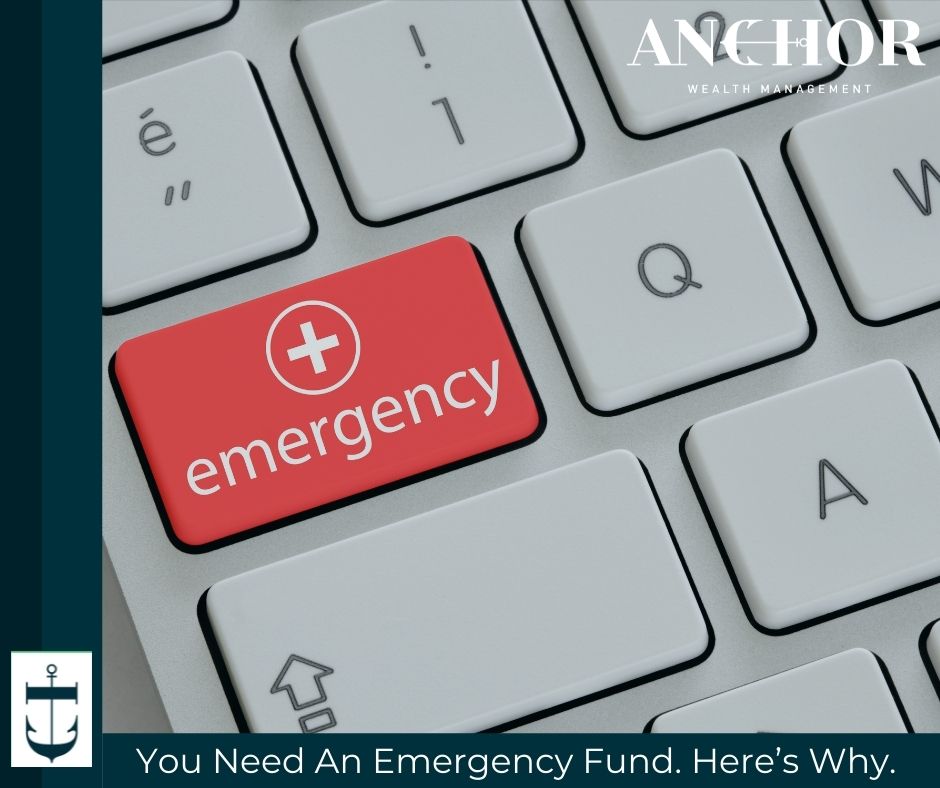
As a financial advisor, I’ve always thought that there is a lot that I could learn from fire marshals. On the surface, we have very different jobs but at the core, we are both interested in helping those we serve prepare for a moment that hopefully will never happen. But while the intent is the same, sometimes the response can be very different. Namely, the response of building tenants to the need to have a fire extinguisher. Fire marshalls instruct their tenants to keep one in place in hopes that they never have to use it. I’m willing to guess that there is not a lot of resistance to the request to keep a fire extinguisher on hand. So what is the financial adviser equivalent of a fire extinguisher? An emergency fund. I recommend it to all of my clients in hopes that they never have to use it.
What is an emergency fund and why does it matter?
An emergency fund is a prescribed amount of money that investors put away for unpredictable situations. It is a break-glass-in-case-of-emergency account intended to be a safety net for individuals, but its benefits can be much greater than putting out critical financial fires.
The goal for an emergency fund in its infancy should be $1,000. As you save towards the emergency fund, put the money in an account or a secured place that is accessible but not tempting. The thousand-dollar goal here is intentionally set because that amount will reasonably cover any real emergencies that arise on your path to financial independence. But in addition to providing a safety net, the act of saving for an emergency fund creates a mental change in investors that I have seen play out hundreds of times, and it never gets less satisfying.
Through the act of saving up for the initial emergency fund, investors discover that they have the discipline necessary to control their own financial destiny. This is the first step to prioritizing money’s purpose over its performance. With that newfound discipline comes the ability to prioritize your finances in a way that allows you to pay off all of your debt and begin creating proactive strategies that allow you to achieve your financial goals, like purchasing a home, or realizing your dream retirement. The $1,000 emergency fund is very achievable and once someone begins to win with money, that winning becomes very fun and creates new habits.
What Is A Fully-Funded Emergency Fund?
The first $1,000 in an emergency fund is just the start. Once that goal is achieved, I work with my clients to pay off all debt with the exception of their mortgage. Once that step is completed, it’s time to fully fund the emergency fund. So what does fully-funded mean? There are no straight answers as before with the $1,000 initial plan. The basic principle here is that you want three months of expenses saved up in your emergency fund. That should cover rent/mortgage, food, and basic expenses for up to three months if you need it. If your current job presents some instability, I recommend having six months of expenses saved away.
Why Not Just Invest This Money?
As a financial advisor, the bulk of my job involves teaching investors how to make smart investments that allow their money to work for them and grow in a way that helps them achieve their goals. So it may seem counterintuitive that I would recommend that someone put a large sum of money in an account or a hiding spot where it doesn’t grow or change. Why don’t I coach people to invest their emergency fund? There are a few reasons. First, once the money goes into an investment account, it will grow but there are penalties and restrictions that prevent the money from being easily accessed. Emergency funds should be available instantly because emergencies don’t RSVP to announce their arrival. The second reason is centered around the first thing I tell all of my clients—there is some risk in all investments. Your emergency fund should be a zero-risk game, you want to guarantee that it will always be there when you need it.
What Is An Emergency For The Emergency Fund
Here’s an interesting thing about emergency funds, my wife and I have been dutifully keeping our fully-funded emergency fund for nearly two decades and we’ve never had to tap into it! Some of that can be attributed to some fortunate luck, but I think greater credit goes to the mental shift that is created when your emergency fund is in place. Things that once felt like they could become life-altering emergencies soon become just a small hiccup on the path to financial independence. Creating an emergency fund isn’t the most fun financial thing you will ever do, but it is the starting point to much more fruitful endeavors. It will feel like a hassle while you are working towards it but it will be one of your proudest accomplishments once you achieve it. I’ve seen it happen time and again.
Are you ready to get started on a path to financial independence where once-emergencies are now just a small bump in the path? Start saving towards your $1,000 emergency fund and reach out. I would be honored to help you set a course for your financial journey.
Adam Ludwig, CEO/Wealth Advisor
